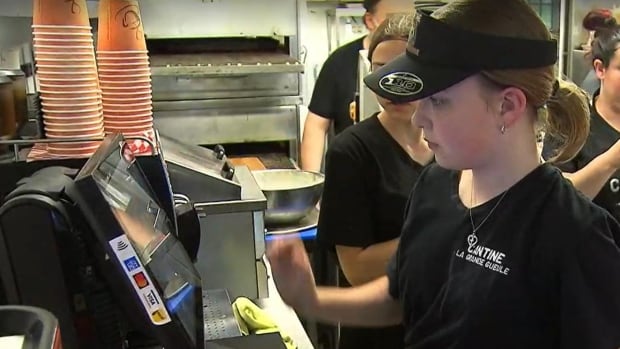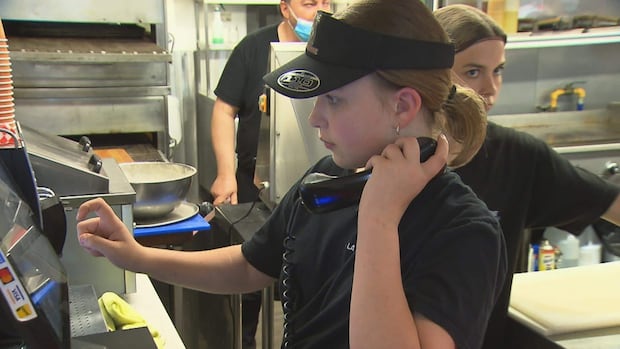
Saskatchewan residents are due to vote in a general election later this year and a business group in the province hopes the next government will lower the province’s “absolute minimum” working age to 13 years old.
In a set of pre-election policy recommendations, the Saskatchewan Chamber of Commerce highlights challenges from a “labour shortage” in the province and suggests the existing age of 14 is too high.
It says lowering that limit by one year would strike “a balance between protecting youth and encouraging early labour force engagement.”
The mere suggestion has reignited debate around how young is too young to have a job. It’s also highlighted how complex child-labour laws are in Canada.
If Saskatchewan were to go this route — and to be clear, the current government says it has no plans to do so — it wouldn’t put the province offside with existing rules in other parts of the country. Some provinces already allow 13 year olds to work, typically with significant restrictions on the types of labour they can do and the number of hours they can spend doing it.
What sets Saskatchewan apart in talking about lowering its “absolute minimum” working age from 14 to 13, however, is the way things are headed. Other provinces that have recently adjusted their child-labour laws have gone in the other direction.
“This idea in Saskatchewan of possibly lowering the age is really going against the trend we’re seeing across the country of bolstering restrictions,” said Sean Tucker, a professor of occupational health and safety at the University of Regina.
Each province and territory has its own set of laws and regulations and, often, exceptions to those laws and regulations.
For the most part, 16 is the age at which youth can work in most types of jobs, with some restrictions on dangerous occupations.
In some jurisdictions, though, kids as young as 12 are allowed to work under certain conditions.
Minimum ages and primacy of education
An underlying principle to all child-labour laws in Canada is that, if kids work, it shouldn’t interfere with their education.
This is often codified in regulations limiting the number of hours and the time of day (or night) that kids and teens can work while school is in session.
In Saskatchewan, as it stands, teens aged 14 or 15 who complete a Young Worker Readiness Certificate Course are allowed to work up to 16 hours during a school week but cannot work before classes begin on a school day or after 10 p.m. the night before a school day.
The laws are a little bit looser in Manitoba, where teens ages 13 to 15 who complete a similar course can work up to 20 hours during a school week, but they are barred from working between 11 p.m. and 6 a.m.
In Alberta, 13 and 14 year olds are allowed to work in certain types of jobs, at certain times of day, provided they have parental consent. Some types of jobs require an additional adolescent employment permit.
In B.C., kids as young as 12 are allowed to do limited types of “light work” for family-run businesses but cannot work more than four hours on school days or more than 20 hours during a school week.

Ontario has a minimum working age of 14 and employers are generally “prohibited from employing children under the age of 16 during school hours,” with a few exceptions.
In Newfoundland and Labrador, kids under the age of 14 are not allowed to have jobs unless the work is specifically prescribed within government regulations. Work hours are also limited for youth under the age of 16.
The Maritime provinces don’t specify an absolute minimum age for work but, for anyone under the age of 16, they each have regulations on work hours and a general restriction against any kind of work that is “likely to be harmful” to a child’s education or development.
The Northwest Territories and Nunavut have similar stipulations to the Maritimes, while Yukon sets a hard minimum working age of 12 years old. All the territories have time-of-day rules for working youth.
Quebec, meanwhile, just adopted new rules last year.
Recent changes to child-labour laws
Quebec’s law to limit the number of hours teens can work during the school year took effect on Sept. 1, 2023.
The new law also set a minimum legal working age of 14 in the province.
The changes came after decades of advocacy from organizations that had been concerned by the relatively lax child-labour laws in Quebec.
“We have seen an increase in the number of hours kids have been working over the past few years and they’re getting younger and younger,” Andrée Mayer-Périard, president of the Réseau Québécois pour la réussite éducative, said last August, just before the new law took effect.
Quebec, too, is dealing with a labour shortage in some areas, but Karl Blackburn, the head of the largest employers’ group in the province, the Conseil du patronat du Québec, said kids are not the solution.
“We can’t ask youth to bear the weight of the staff shortage,” he said last August.
WATCH | From June 2022, Quebec turns to youth workers to fill shortages:
Some Quebec businesses are hiring employees as young as 11 to fill labour shortages. The province has no minimum working age, but shifts can’t interfere with school and guardian approval is required for employees under 14.
The child-labour laws in B.C. are also relatively new, having been adopted only a few years ago.
In 2021, the provincial government enacted changes that raised the general working age from 12 to 16, bringing B.C. in line with other provinces and international child-labour standards.
It also created legal definitions of “light work,” which refers to tasks that are not considered harmful to a child’s health or development. Teens aged 14 and 15 are generally limited to this type of work. Those aged 12 and 13 can do light work for family-owned businesses.
There are, however, plenty of exceptions — in B.C. and elsewhere.
Traditional kid work and child entertainers
The new B.C. law makes special carve outs for kids as young as 12 to work as camp assistants, assistant coaches, referees or umpires.
Alberta specifically exempts youth who are self-employed or acting as independent contractors from its employment regulations. Other provinces have similar exceptions for self-employed youth.
“This may include babysitting, delivering flyers or cleaning a yard in the neighborhood,” the Manitoba government explains.
Similar provisions exist in other provinces. Exceptions for farm work are also common.
Numerous provinces also have separate rules for kids working in artistic endeavours or the entertainment industry.
Babies as young as 15 days old are allowed to participate in recorded performances. This can include acting in film, television shows, commercials and video games.
For live performances, the rules are often different.
In B.C., for example, anyone wanting to employ a child performer under the age of four needs to apply for a permit.
Permits can also be applied for outside the entertainment industry. Numerous provinces and territories have additional carve-outs in their labour laws for unusual or exceptional circumstances, giving provincial or territorial governments the ability to approve work for kids on a case-by-case basis.
Risk and reward
In establishing their own regulations over the years, various governments have looked at both the risk and rewards of youth employment.
“Studies show that having a job contributes to a young person’s sense of identity, connectedness and well-being,” according to an archived policy document from the Government of Ontario.
“Employment is also an opportunity to connect with others and develop the skills needed to contribute to society.”
In a 2001 study, Statistics Canada looked at how working during high school affected students. Consistent with previous research, it found students who worked a moderate number of hours were actually less likely to drop out of school than those who didn’t work at all. But it also found students who worked excessively (more than 30 hours a week) were the most likely to drop out.
Then there are safety concerns. Most provinces restrict youth from working in particularly hazardous jobs, but that doesn’t eliminate all risk.
WATCH | This teen was poisoned by carbon monoxide and his employer received no penalty:
The family of a then-14-year-old who suffered severe carbon monoxide poisoning while working at a Saskatchewan grocery store tell CBC’s Go Public they are outraged there were no serious consequences for his employer.
In October 2023, Wil Krotenko, then 14, nearly died from carbon monoxide poisoning after being directed by his manager to clean the enclosed areas of the meat department at the local Co-op grocery in Canora, Sask., about 250 kilometres northeast of Regina.
Krotenko was provided with a gas-powered pressure washer but given no training on how to use it properly, according to a workplace safety report.
“That was a very serious case,” said Tucker, with the University of Regina.
In general, he said, younger teens can be especially vulnerable to a variety of workplace hazards, even with the existing laws.
“What happens is you can end up with a 14 or 15 year old in a workplace that’s restricted to doing light-duty work, but the supervisor may not know those restrictions and assign the worker to other work,” he said.

Sexual harassment or verbal abuse is also a risk, whether its from bosses, coworkers or customers.
“These are experiences that young teenagers should not be exposed to, and the best way to prevent that exposure is to have a restriction on the working age,” Tucker said.
In his view, existing labour laws ought not to be loosened.
The Saskatchewan Chamber, for its part, said it’s always been an advocate for workplace safety and workplace standards.
It declined an interview with CBC News about its policy recommendation but, in a written statement, said: “Ultimately, the [Saskatchewan Chamber of Commerce] believes the decision for a youth to enter the workforce resides with the youth and their family/guardian.”

